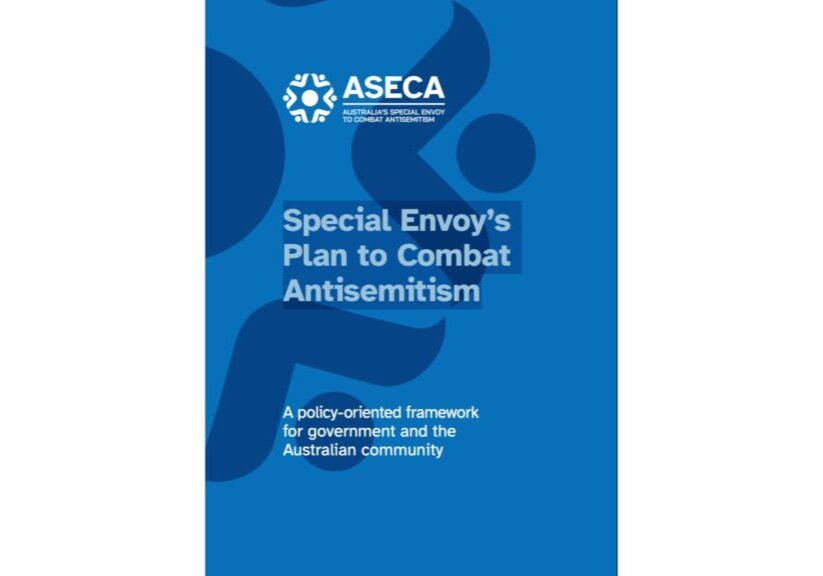Australia/Israel Review
Climate of Hate
Dec 18, 2009 | Jeremy Jones
By Jeremy Jones
I begin with a disclaimer – I don’t enjoy this subject. The activities in which I engage include promoting understanding of Jewish life and Judaism, helping the Australian community increase its understanding of Israel and the Middle East and promoting human rights in my own country and internationally.
Also, for the past 20 years, I have been tasked by the Jewish community with compiling, analysing and reporting on acts of anti-Jewish violence, vandalism, intimidation and harassment.
Virtually every day I see one or more reports of a Jewish person being assaulted, Jewish communal property vandalised, abusive and threatening emails, offensive letters and telephone calls or abuse yelled at identifiably Jewish people from passing vehicles.
In addition, I see the regular print and on-line publications of organisations which are essentially antisemitic and others which include antisemitism in their verbal armoury.
Add to this complaints of items in the media ranging from crude antisemitic stereotypes to the deliberately offensive analogies of Jews as Nazis, religious preaching against Jews and Judaism, to sloppy use of language, particularly regarding the Shoah, and you may have some understanding of the unedifying material that needs to be analysed and included in my annual summaries.
In reviewing the material collated over two decades, one gains an insight into the behaviour of antisemitic Australians and the response to them by the wider population.
First, it is important to be aware of what acts are perpetrated by antisemites.
In the 12 months ending September 30, 2009, 962 incidents of “racist violence” were directed at Jewish Australians using the 1989 definition adopted by the Human Rights and Equal Opportunity Commission (since renamed the Australian Human Rights Commission).
The tally of 962 incidents exceeded by 48% the previous highest total, recorded in the 12 months ending Sept. 30, 2008. It was well over twice the previous average annual total.
The actions included are as diverse as physical assault of men and women targeted due to the fact they are visibly Jewish, abuse yelled at people walking to and from synagogue, vandalism of Jewish property, antisemitic graffiti and offensive abuse and threatening e-mails, faxes, letters and telephone calls.
After 20 years, the database on such incidents now includes 534 examples of violence against people or property, 894 of face-to-face harassment and intimidation not including violence, 659 threatening or abusive telephone calls, 1,270 items of hate mail, 804 reports of graffiti, 2,715 individual or multiple emails and 637 miscellaneous incidents such as leafleting, posters and faxes.
It is relevant to note that this is only the number of incidents which satisfied relatively strict criteria for inclusion – if every incident that may possibly, but not definitively, have been antisemitic was included, the tally would likely be in the tens of thousands.
As well as acts of racist violence, antisemitic campaigners try to negatively impact on Jewish people’s participation as full and equal members of society, often attributing malevolent motives to them that misrepresent both actions and motivations.
One arena in which they operate is the news media, and in this they have greatly benefited from the communications revolution which has seen massive expansion of propaganda platforms.
While in the past some anti-Jewish letters to the editor were published after alleged scrutiny by responsible editors, a huge volume of crude and malicious anti-Jewish commentary is more recently to be found on blogs maintained by mainstream media organisations.
In addition, perhaps as a result of the empowerment this lack of responsibility has given them, far more anti-Jewish letters are being published in newspapers that previously would have rejected them.
Anti-Jewish Australians also form organisations to further their agendas, sometimes following on one theme (e.g. support for Nazism) and at other times bundling antisemitism with other campaigns (e.g. anti-multiculturalism, anti-Western, pro-terrorism).
These groups publish, hold meetings and run propaganda campaigns, and they often feature motley collections of individuals held together by common hate beyond any genuine concern for political or policy reform or change.
It is a credit to the good sense and common decency of Australians that these campaigns rarely, if ever, gain any traction with the public, but during the short lives of most of these virulent propaganda activities considerable discomfort is caused to Jewish Australians.
When assessing the most significant developments over the past 20 years, there are a number of types of change which are deserving of comment.
The development of the internet has had an incredible impact. Racist individuals and groups have a cheap and easy access to platforms and virtual megaphones. Anonymous emails can be sent quietly and at virtually no cost, regardless of where the target is physically located. Individuals whose racist behaviour and opinions alienated those around them can find communities of co-believers and gain empowerment. Sources of deliberate disinformation can have on-line appearances no different to objective and reliable resources, leading to the flourishing of myths and confusion regarding virtually every issue which is of direct concern to Jewish Australians.
There have also been changes in rhetoric and behaviour, some but not all connected to the globalisation facilitated by new technology.
The internationalisation of campaigns against Israel has brought with it the injection of racial rhetoric into the previously civil discourse which generally prevailed in Australia at an unprecedented scale, with “red lines” crossed – particularly regarding the invocation of language relating to Nazism.
In Australia, sections of the political left have been recruited to international campaigns lending support for overt racists and fascists such as Hamas, and even of the theocratic dictatorship of Iran.
Another development has been the growing use of individuals who are, or claim to be, part of the Jewish community to parrot anti-Israel and/or anti-Jewish slurs, as if ethnicity gives them moral immunity or even moral authority. Twenty years ago the same people would have been recognised as unreliable egoists, bizarre religious eccentrics, sad individuals projecting their own inadequacies on to the community from which they came, self-seeking opportunists or otherwise less than admirable. Today, however, it is rare to find any anti-Jewish group, be it Holocaust-denying, Muslim extremist, pseudo-Christian or ultra-left which doesn’t have one (or more) pet Jew “proud to be ashamed to be Jewish”.
Over the past two decades, a change in Australia has been that it has become home to a significant population of followers of Islam. This diverse group comes from many countries and includes a wide range of practices, affiliations and beliefs. Within this number are some sub-cultures which are fundamentally hostile to Jews, as well as others who have quite a different understanding of the appropriate way for Muslims to think and behave.
On the other hand, 20 years ago the publications and activities of segments of Eastern and Central European, and anti-Jewish Christian groups, were of far more concern and relevance than they are today.
When it comes to physical antisemitic acts or the volume and visibility of those who want to diminish the quality of life of Jews and the Jewish community, one constant has been in place – the actions are more numerous and the volume of rhetoric louder when there is a belief by antisemites that there will not be any consequences for their actions. Obversely, when there is publicity given to arrests, trials and convictions of racists and when there are loud and unambiguous voices of condemnation from prominent moral and political figures, the bullies and cowards who predominate amongst members of the anti-Jewish subculture retreat to the dark corners of society.
For this reason, the most important developments over the past 20 years may well be the positive changes.
Federally, and in all states and territories, there are now laws in place which provide a measure of recourse to victims of antisemitism.
There have been a series of parliamentary resolutions and political pronouncements abhorring anti-Jewish behaviour.
Major churches, most notably the Catholic, Uniting and Lutheran, have taken significant steps in confronting anti-Jewish beliefs and actions both within and without.
Jews, Muslims, Christians, Hindus, Buddhists, Sikhs and Baha’is have developed good communication, cooperation and collaboration towards developing a genuinely tolerant and pluralist Australia.
Finally, those concerned with antisemitism internationally are now working together, taking advantage of technological advances to develop strategies and share experiences so as to work better towards a situation where, in 20 years’ time, antisemites will be more marginal and less relevant than today or any time in the past.
On behalf of AIJAC, Jeremy Jones has been compiling data and preparing an annual report on antisemitism in Australia for the past 20 years. This annual report is also presented to the Executive Council of Australian Jewry.
Tags: Antisemitism






